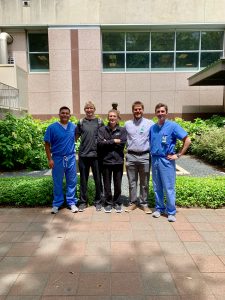
Ben Grubbs ’20 — Observing situations involving high risk pregnancies can be tough at times and beyond rewarding at others. My very first case involved a patient with anencephaly, a rare condition that results in the lack of development of a skull during pregnancy, something I was not prepared for. The physician consulted the couple for the next hour going over every option and possible outcome so that the family understood the severity of the situation and could make the best decision for themselves and the child. Immediately following, I walked into the operating room to observe an in-utero spina bifida neurosurgery, only the 87thsurgery at this hospital and certainly an extremely rare surgery that few hospitals in the world have the capability of performing. I discussed with the surgeon afterwards as he reminisced on the first one he did just a few short years ago, dramatically increasing the life span of a young girl whose family he keeps in touch with. It was a roller coaster of a first day seeing these cases and left me excited for the rest of my six weeks here in Houston at Memorial Hermann Hospital.

My next experiences led me to the gift of life as I observed multiple caesarean sections resulting in the successful births of healthy babies. It is a moving sight to see the moment a baby takes its first breath and enters the world we have known for so long. You can’t help but imagine the life ahead of the child and think you may have been in that exact position many years ago. In a hospital on the leading edge of technology, there is always something new and groundbreaking going on whether it be research or surgery. It is promising for the future as we continue to correct conditions that were a sure death sentence at the turn of the 21stcentury with advancements from physicians that are compassionate about pushing forward the capacity of life and giving hope in situations where there is little. These experiences solidify my decision to enter the field of medicine and contribute a sliver to the progress of our world.